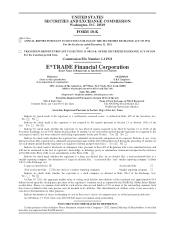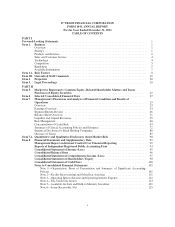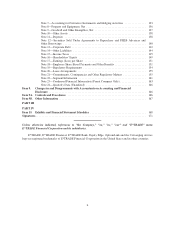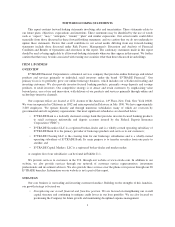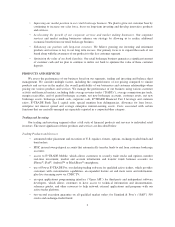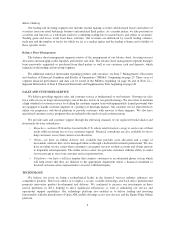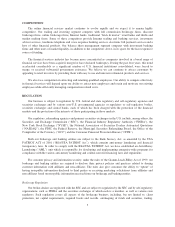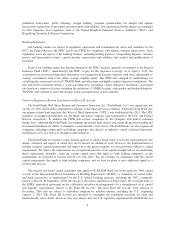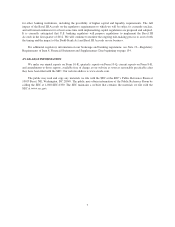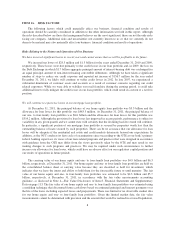eTrade 2011 Annual Report Download - page 9
Download and view the complete annual report
Please find page 9 of the 2011 eTrade annual report below. You can navigate through the pages in the report by either clicking on the pages listed below, or by using the keyword search tool below to find specific information within the annual report.prohibited transactions, public offerings, margin lending, customer qualifications for margin and options
transactions, registration of personnel and transactions with affiliates. Our international broker-dealers are regulated
by their respective local regulators such as the United Kingdom Financial Services Authority (“FSA”) and
Hong Kong Securities & Futures Commission.
Banking Regulation
Our banking entities are subject to regulation, supervision and examination for safety and soundness by the
OCC, the Federal Reserve, the FDIC and by the CFPB for compliance with federal consumer finance laws. Such
regulation covers all aspects of the banking business, including lending practices, safeguarding deposits, customer
privacy and information security, capital structure, transactions with affiliates and conduct and qualifications of
personnel.
Each of our banking entities has deposits insured by the FDIC and pays quarterly assessments to the Deposit
Insurance Fund (“DIF”), maintained by the FDIC, to pay for this insurance coverage. As of April 1, 2011, the
assessment base for insured depository institutions was changed from domestic deposits, with some adjustments, to
average consolidated total assets minus average tangible equity. The FDIC also changed its methodology for
calculating the assessment rate for E*TRADE Bank and other large and highly complex depository institutions. The
new risk-based assessment utilizes a scorecard method for calculating a large depository institution’s assessment
rate based on a number of factors, including the institution’s CAMELS ratings, asset quality and brokered deposits.
The FDIC will continue to assess the changes to the assessment rates at least annually.
Financial Regulatory Reform Legislation and Basel III Accords
The Dodd-Frank Wall Street Reform and Consumer Protection Act (“Dodd-Frank Act”) was signed into law
on July 21, 2010 and includes comprehensive changes to the financial services industry. Under the Dodd-Frank Act,
our primary federal bank regulator, the Office of Thrift Supervision (“OTS”), was abolished in July 2011. The OTS’
regulatory oversight responsibilities for the thrifts and parent company were transferred to the OCC and Federal
Reserve, respectively. In addition, the CFPB will oversee compliance by the Company with federal consumer
finance laws. Although the Dodd-Frank Act maintains the federal thrift charter, and retains the previous lending and
investment limitations for thrifts, it eliminates certain benefits of the charter. The Dodd-Frank Act also requires all
companies, including savings and loan holding companies, that directly or indirectly control an insured depository
institution to serve as a source of strength for the institution.
The Dodd-Frank Act requires various federal agencies to adopt a broad range of new rules and regulations, the
details, substance and impact of which may not be known for months or years. However, the implementation of
holding company capital requirements will impact us as the parent company was not previously subject to capital
requirements. We believe the requirements are an important measure of our capital strength and we are monitoring
these requirements internally, using the current capital ratios that apply to bank holding companies, as the
requirements are expected to become effective by July 2015. We are currently in compliance with the current
capital requirements that apply to bank holding companies, and we have no plans to raise additional capital as a
result of this new law.
The current risk-based capital guidelines that apply to E*TRADE Bank are based upon the 1988 capital
accords of the International Basel Committee on Banking Supervision (“BCBS”), a committee of central banks
and bank supervisors, as implemented by the U.S. federal banking agencies, including the OCC, commonly
known as Basel I. In September, 2010, the Group of Governors and Heads of Supervision, the oversight body of
the BCBS, announced agreement on the calibration and phase-in arrangements for a strengthened set of capital
and liquidity requirements, known as the Basel III Accords. The final Basel III Accords were released in
December, 2010 and are subject to individual adoption by member nations, including the U.S., beginning
January 1, 2013. The Basel III Accords are intended to strengthen the prudential standards for large and
internationally active banks; however, they may impact how the U.S. regulators implement the Dodd-Frank Act
6

